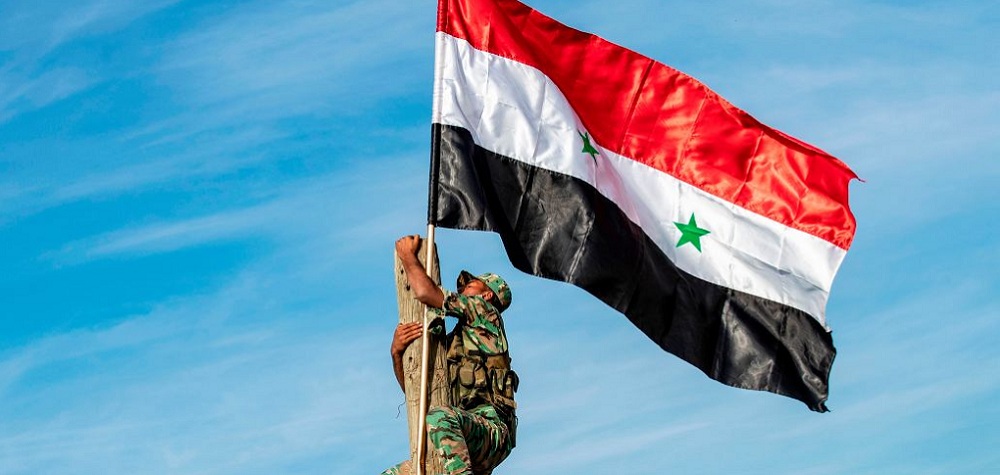Alwaght- Syrian army forces and Russia military police entered on September 13 Al Yadudah town in Daraa province south of Syria. Damascus, mediated by Russia, managed to strike a deal with tribal leaders inside the town according to which the armed groups should hand over all their weapons to the Syrian army and the town to the government. According to media reports, as soon as the Syrian army entered the town, it set up a center to monitor the situation of the armed elements, and the weapons of the armed opposition are to be handed over under the supervision of the Russia and tribal leaders. The Syrian army is also set to conduct house-to-house searches.
This comes as Daraa city went under the control of the army in a similar Russian-sponsored deal.
The new process of control of the southern regions of Syria by the central government without clashes can be considered the beginning of a new era in the Syrian crisis and described as a period of peaceful progress to transition from the crisis stage. In the new conditions, as a result of the developments in Syria over the past few years, Syrian citizens, realizing the true nature of terrorist groups, have taken the path of peace with the legitimate government of the country.
Seeking peace through path of central government
10 years after eruption of the crisis in the country, the citizens who are exhausted from insecurity and terrorism are embracing the central government as the restorer of peace. The epitome of this sense is Daraa in which on the one hand the terrorist militias finalized the second stage of their deal with the central government and surrendered and on the other hand the displaced people began to return home as army took control.
On September 6, the army forces arrived in Daraa city and marked the victory over terrorists by raising the national flag.
The Syrian army moved to downtown Daraa after about 850 gunmen surrendered their weapons to be pardoned under a ceasefire agreement. The deal means that the militias have no strongholds in Daraa except for Tafs district in Daraa's western outskirts and Busra Al-Sham and its vicinity mainly led by militia commander Ahmad al-Aouda.
Following the deployment of the army in the Daraa city, many residents who returned to their homes also expressed their joy at the terrorists' departure and thanked the army. This clearly shows the frustration of the citizens with the presence of terrorists in the areas where they live, and it is the beginning of the similar deals in other areas of the country.
Growing legitimacy and promising steps towards return of peaceful Damascus governance
The incidents of Daraa in the past two weeks carry a set of messages from the Syrian battleground developments:
First, the developments demonstrate a big shift in the Syrian equations. In the new arena, terrorists in the southern and northern Syria, realizing their inability to confront the central government and disappointed by their Arab and Western sponsors, have come to believe that by surrendering with impunity they can survive in a minimal state as advancing their past agenda is unthinkable. Terrorists in Idlib, the last major stronghold of the anti-government militias, will possibly acquiesce to a similar scenario.
Second, peace between tribal leaders and the central government means augmentation of the legitimacy and position of the Syrian central government and President Bashar al-Assad himself among the Syrian people. Although 95 percent of the citizens voted for Assad reelection in May, the surrender without clashes of terrorist groups and the return of citizens to their areas of residence is an event that has further increased the popularity of the government in the country.
Third, that the events of the last two weeks in Daraa were mediated by Russia shows that the Syrian people and the tribal leaders in Syria believe in the Damascus-Tehran-Moscow alliance as a reliable party, and this bloc can operate without the mediation of the Western-Arab-Turkish bloc and negotiate directly with the opposition and reach lasting agreements. This confidence now more than any other time can pave the way for similar agreements in northern areas, something bringing about positive results for peace and stability in Syria.
Fourth, in the north the Kurds hold a considerable part of the Syrian territory. In northwest, terrorists are massively present in Idlib and northern Aleppo. The Kurds, already established contacts with Damascus, can follow suit and strike a peace deal with Damascus. In Idlib and northern Aleppo, the Turkish-backed terrorists are somehow not poised to make compromises, however. Still, the recent agreement makes it certain to the anti-Damascus militias that they have no choice but surrender to the central government's resolve to spread the rule of law across the country.



























